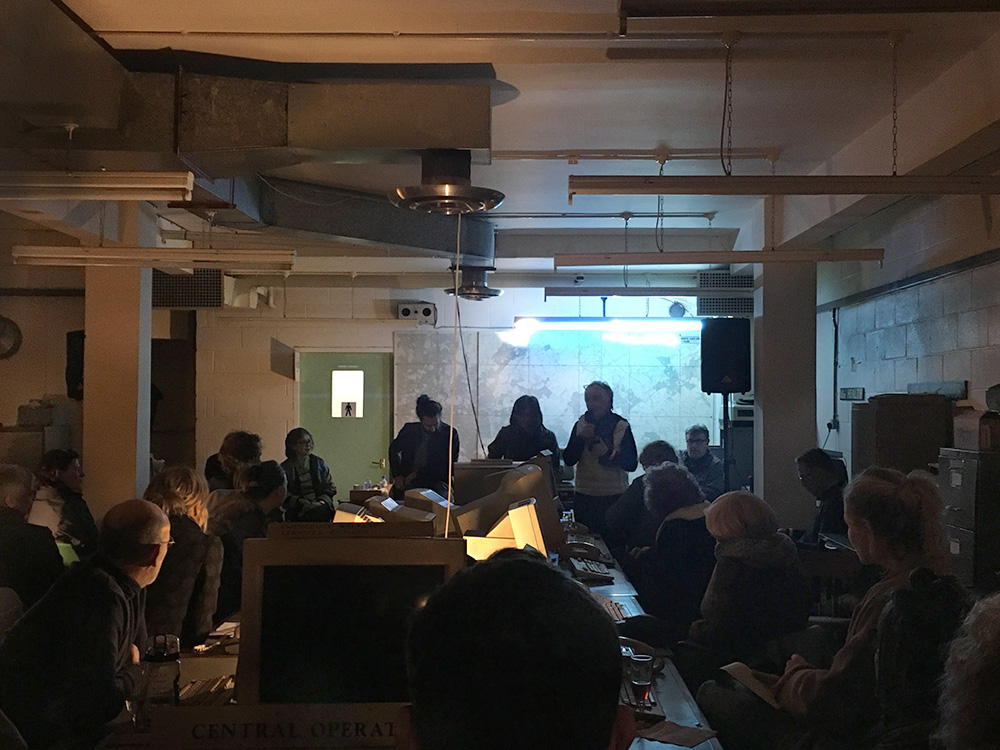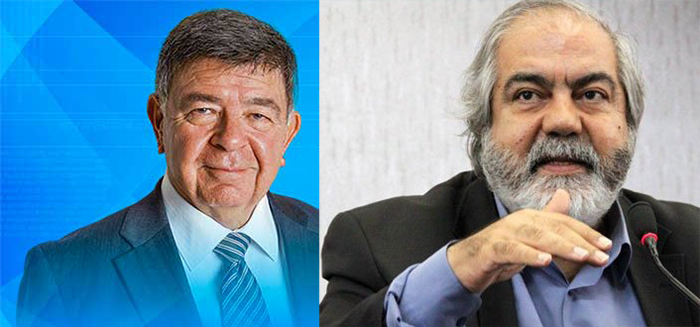15 May 2018 | Academic Freedom, News
[vc_row][vc_column][vc_single_image image=”100370″ img_size=”full” add_caption=”yes” alignment=”center”][vc_column_text]Written by: Che Applewhaite, Samantha Chambers, Claire Kopsky and Sarah Wu
Survivors of the Stoneman Douglas High School shooting in Parkland, Florida, have been making headlines lately with their calls for more American students to help them change the country’s gun laws. Their right to protest and petition politicians is enshrined in their right to free expression under the First Amendment.
It is clear that the US student body — whether at high school or college — is conflicted over the issue of free expression and what is or isn’t acceptable speech. While some recent surveys and studies show attitudes to be generally supportive of freedom of expression as an important right, in practice this isn’t always the case.
At this vital moment, students around the USA should see why free speech is so vital on their campuses, whether high school or university and what they have to lose if they won’t fight for it.
“Free speech must apply to everyone — even those whose views we find objectionable — or it applies to no one,” says Jodie Ginsberg, CEO of Index on Censorship. “Only by being able to express themselves freely and honestly, and also being exposed to as wide a range of viewpoints as possible can these get the most out of their education.”
In the past, the usefulness of free speech as part of such a campaign was much less in dispute. Martin Luther King Jr’s speeches and the student movements of the 1960s, which together changed a generation, relied on this very freedom. A lot of demonstrations today seem more geared towards the suppression of speech, such as those targeting conservative and alt-right voices like Milo Yiannopoulos at Berkeley and Richard Spencer at Michigan State University.
Students from four US universities weigh in on the issue and tell Index what is fair game on campus and what isn’t.
(Not) talking about race
The University of Missouri, colloquially known as a Mizzou and described as a “liberal student body in a red state”, is no stranger to racial tension. In 2015 the school saw protests by its football team and a graduate student go on hunger strike as part of a campaign to have the school’s president resign after mishandling racial issues on campus. This was followed by a drop in freshman enrollment and funding to the school.
Evan Lachnit, who studies journalism and sports at Mizzou, says that there are certain topics that, in the current political climate, are often too hot to touch. “As it relates to history, if there is one subject everyone appears to walk-on eggshells around, it would be slavery, one of, if not the largest, scars in American history,” he says. “It’s something many will just avoid altogether.”
The issue of “hate speech” — including speech considered to be insulting to a particular race — at Mizzou prompted the University of Missouri Police Department issued a campus-wide email asking “individuals who witness incidents of hateful and/or hurtful speech” to call them “immediately”. The police admit that “cases of hateful and hurtful speech are not crimes”, leaving many to wonder why they feel this is an issue the force should be concerned with.
“There is no question that a great deal of ‘hateful and/or hurtful speech’ is protected by the First Amendment, and that punishing students whose speech is determined to meet such a troublingly vague and subjective standard will violate students’ constitutional rights,” Fire, an organisation that campaigns for individual rights in higher education, said in a letter to the school’s chancellor, R. Bowen Loftin. “It is crucial that students be able to carry out such debates without fear that giving offence will result in being reported to the police and referred for discipline by the university.”
Sophie Kissinger, a senior studying history at Harvard University, claims that the ways in which her subject was taught in the past limits knowledge of American slavery today. Recently gifted a 1926 Harvard syllabus that outlines the core requirements for a history student at the time, she notices the document’s “neglect of the oppressed”. “These narratives largely serve to perpetuate a system of erasure, reinforcing colonial ideologies and degrading the lives of oppressed peoples,” she says. “This erasure is all around us today: only 8% of high school senior can identify slavery as the central cause of the Civil War and most don’t know an amendment to the US Constitution formally ended slavery”.
Over at Villanova University, Emily Bouley, a junior studying business and psychology, says that privilege can be tricky to discuss because “everyone has different definitions of what privileged means”.
One topic in particular that’s likely to receive backlash, Bouley says, is affirmative action, those measures that are intended to end and correct the effects of a specific form of discrimination. “One time my professor was really passionate about racism against white males in job selection since there are more programs aimed towards diversity now than ever before, which is great, but sometimes candidates will get chosen because they are of a minority,” Bouley says. “Often this isn’t the case, but I felt so uncomfortable sharing my opinion because yes it happens and doesn’t support equality but it’s very hard to argue without sounding racist.”
Thanksgiving rule on campus: no politics
Located in the fifth most liberal city in America as ranked by Forbes, Boston University students are aware of the politically left-leaning environment they live in. But as with the family dinner table at Thanksgiving, heated conversation about politics is discouraged on campus.
According to the school’s policies, students must not “impose” offensive or upsetting views on others. Nicole Hoey, a junior studying journalism and English at the school, says the overwhelming liberal majority, though welcoming of opposing ideas, has a tendency to silence conservative voices through the sheer volume of liberal students. “As a journalist, free speech is so important,” Hoey says. “And for the most part, BU does a good job at promoting free speech on campus.”
“But I think people who voted for Trump would feel more frightened to speak their minds because we’re so liberal,” Hoey adds. “I think the only time they would feel safe is if they’re in College Republicans”.
This is probably why, following the 2016 election and the election of Donald Trump as president, BU College Republicans have seen an increase in attendance.
International studies major at the University of San Francisco Adule Dajani notes that “professors make their political views known pretty discreetly”. As a left-leaning school in a democratic state, Dajani says that USF professors try to remain unbiased by “talking about both the pros and cons of an issue”. However, she finds the conduct of the classroom facilitated by professors to be the main silencer for those in the minority side on any debate. “I can see how someone would feel too uncomfortable to speak up because the students are hotheads,” she says.
Candace Korasick, a professor at the school’s department of sociology at Mizzou, says her classes often tackle difficult issues, but there are some too controversial to discuss. “There are topics that I once would have broached in a class that I, not avoid, but now don’t initiate. And if students initiate them, I feel as if I’m tiptoeing through a minefield,” Korasick explains. “The two topics that I’d rather avoid are abortion and the Confederate flag. It is difficult to have a conversation with more than one or two students at a time on issues like that.”
Journalism and business student Nina Ruhe says topics like race, sexual assault and political beliefs are ones professors handle with “delicacy” on a surface level. For her, that’s a shame because it means she’s not getting any depth of knowledge on these topics as part of her education.
“While doing this allows the educators to say they’ve covered the issues and say that they’ve taken part in these important discussions, they also don’t go deep enough as to letting there be any real form of discussion,” Ruhe says. “Unfortunately, when I have heard of educators that have attempted to go into in-depth conversations about these topics, they are shut down by complaints from parents or superiors and are forced to stop.”
The right to freedom of expression and the right to peaceful protest are crucial in a democracy – and crucial to any success the students of Parkland may have in changing America’s gun laws. They must be in no doubt that it a right that is on their side.
Later this year Index on Censorship will release a report on the freedom of speech on campus[/vc_column_text][/vc_column][/vc_row][vc_row][vc_column][vc_basic_grid post_type=”post” max_items=”12″ style=”load-more” items_per_page=”4″ element_width=”6″ grid_id=”vc_gid:1526388582695-a56b5824-ce86-7″ taxonomies=”8843″][/vc_column][/vc_row]
8 May 2018 | Campaigns -- Featured, Media Freedom, Statements
[vc_row][vc_column][vc_column_text]Index on Censorship is pleased to hear the amendments to the Data Protection Bill are likely not going ahead. One of the amendments, which was not voted on, would have left many newspapers having to pay both sides’ costs in a legal dispute – even if the media outlet won. This amendment had serious consequences for a free press, a cornerstone of democracy[/vc_column_text][vc_column_text]On Wednesday, the UK’s House of Commons will vote on the Data Protection Bill: a bill to regulate the way in which personal information is processed.
It is of course critical that we have robust protections over our personal data. Yet, as is so often the case with new laws, Index on Censorship believes we are in grave danger of ushering in one protection only to eliminate another: in this case, the protections afforded to and by a free press.
This is because members of both the House of Lords and Commons have sought to introduce amendments to this bill that would reintroduce into law restrictions on the press that the current government has rightly said it will not implement, namely forcing any publisher who refuses to sign up to a state-approved regulator to pay the legal costs of any data protection case brought against them, even if they win.
Such a measure would, in effect, invite anyone seeking to prevent exposure in the press – including those cases in which exposure, such as the Windrush scandal or MPs expenses, is in the public interest – to threaten legal action to silence a potential publisher. We urge MPs to reject these amendments.
In earlier proposed amendments, any organisation – including non-profit organisations like Index on Censorship – which refused to sign up to a state-approved regulator would have been liable to pay both sides’ costs. The latest amendments on the question of cost-shifting attempts to close that loophole by exempting small publishers but this just makes a mockery of the entire endeavour: either the rules apply to everyone or no one. The ability to hold power to account and expose the corrupt should not be left to one kind of media organisation.[/vc_column_text][/vc_column][/vc_row][vc_row][vc_column width=”1/4″][vc_icon icon_fontawesome=”fa fa-times” color=”black” background_style=”rounded” size=”xl” align=”right”][/vc_column][vc_column width=”3/4″][vc_column_text]
Index does not believe any media organisation should be forced to sign up to a regulator – especially one that has state approval, no matter how arm’s length.
[/vc_column_text][/vc_column][/vc_row][vc_row][vc_column][vc_column_text]Of course, there should be protections for those wronged by the press: but the threat of financial penalties on potential public interest journalism is not the way to do it. Far better is to encourage low-cost, easily accessible and swift redress for all.
Index does not believe any media organisation should be forced to sign up to a regulator – especially one that has state approval, no matter how arm’s length.
For the past five decades, we have monitored state interference in news reporting, from authoritarian Chile in the 1970s to North Korea today. With a history of scrutinising government pressure on media, we were never going to join Impress (currently the only state-approved regulator).
A free press is fundamental to democracy. Investigative and campaigning journalists have exposed scandals that have helped save lives: such as the work done by Index on Censorship’s patron, Sir Harold Evans, on the Thalidomide scandal while editor of the Sunday Times.
More recently, work by journalist Carole Cadwalladr at The Observer broke the Cambridge Analytica story wide open, while Amelia Gentleman’s reporting at The Guardian has driven the story on Windrush.
Without an environment in which such journalists are encouraged to report – without the fear that they might face costly court cases even for reporting stories that are true – who will hold the corrupt to account?
“It is easy to dismiss such concerns as the hysterical whinging of the mainstream media,” said Index on Censorship chief executive Jodie Ginsberg. “That would be a huge mistake. A genuinely free press – one in which both independent investigative journalist outfits and mainstream media organisations can operate – benefits everyone.”
We crush media freedom at our peril. The democratic gains being eroded in Turkey, Russia, Poland and Hungary and elsewhere have all been accompanied by a loss of press freedom: a freedom that is hard won but easily lost.
A version of this statement was first published on the Independent website.[/vc_column_text][/vc_column][/vc_row][vc_row][vc_column][vc_basic_grid post_type=”post” max_items=”12″ style=”load-more” items_per_page=”4″ element_width=”6″ grid_id=”vc_gid:1526037891828-b7251ca2-5483-4″ taxonomies=”6534″][/vc_column][/vc_row]
28 Mar 2018 | Event Reports, News
[vc_row][vc_column][vc_column_text]
“We must distinguish the things that are intellectually dishonest and aimed at persuading, which is traditionally called propaganda, and the things where people are trying to give you general information, which doesn’t have the absolute intention of persuading you,” said The Times columnist David Aaronovitch at a panel at the Essex Book Festival.
Aaronovitch, also Index’s chair, was discussing the role of propaganda with leading expert on the darknet and technology Jamie Bartlett and Chinese-British author Xinran, who was the first woman to have a late-night radio show in China.

The panel, chaired by Index on Censorship magazine editor Rachael Jolley, was part of the festival’s Nuclear Option day at the Kelvedon Hatch Secret Nuclear Bunker, a twisted network of dimly lit hallways and musty rooms that lie beneath a field.
Around 75 attendees gathered on March 25 to listen to Index’s panel and attend other workshops, screenings and performances part of the festival. Everyone at the festival was free to roam the enormous bunker and walk amongst Cold War history.
Passing signs that instructed people to “use water sparingly” and dusty machines that co-ordinated evacuation procedures, attendees eventually made their way to a desk-lamp lit room and were seated at long desks with old, monochrome computers.
Looking at the current state of propaganda, Bartlett said “everything has become more emotional and gut-driven,” adding that politics has not become as informed as people had hoped, but now become “heuristic because people are just showered with information”.
Aaronovitch called the inundation of information the “age of cacophony”.
What is emerging, according to Bartlett, is a “horrible new form of soft surveillance that has encouraged a great conformity among people”.
Xinran said China’s current propaganda, especially on social media, along with party control of education and the legal system has led to “one voice” in China, despite age gaps, class, education and geographical residence.

The author talked about her past experiences with censorship and Chinese propaganda when she worked on her radio show in China. She explained that there was a list of restrictions she had to abide by, these included never mentioning the British media, Western religions or love and relationships. The author said during her show she was able to tackle subjects that were previously taboos on Chinese radio.
“My work was stopped for three months when I spoke about homosexuality,” said Xinran. “This type of censorship was very strong until 1997, but it has now escalated to constant censorship, due to social media.”
Looking at the future of propaganda and its direction, Bartlett added that he can “see much more reliance on coercive digital types of surveillance being absolutely necessary just to maintain some type of law and order in society, especially online, which could make us a much more authoritarian society”.
This led Bartlett to predict that “already authoritarian countries are going to become much more so, and already very free countries are going to become even more free to the point where it might collapse”.
He believes we are shifting to a “Huxleyan society,” which Aaronovitch called the “algorithmic society”. Both felt one big question was, who governs the algorithms?
Aaronovitch noted that it depended on who was controlling the algorithms, saying that if the EU requested that Google to reveal its algorithms, it would be problematic; however, governmental algorithms used for policing in a democratic society were essential.
With reference to the Cambridge Analytica scandal, which was mentioned numerous times during the panel, Bartlett noted that the worry over “Cambridge Analytica’s 5,000 data points on every single American doesn’t compare to what’s coming”.
“We are going to be creating a lot more data in the future,” said Bartlett. “And it is going to be shared and it is going to be used by political actors.”
Aaronovitch advised the audience that the best way to combat propaganda is to ask yourself, “‘Am I wrong?’. The point is to ensure no one is “completely blinded by initial preferences”.
Similar to Aaronovitch’s warning to predisposed biases, Xinran calls for “independent thinking,” and equated the consumption of information with eating.
“In Chinese we say you become what you eat,” said Xinran. “And your brain is the same way. You become what you are by what you believe”.
Hats off to @EssexBookFest! An incredible day at the Secret Nuclear Bunker. Brilliant discussion with @IndexCensorship, @JamieJBartlett, @DAaronovitch, @londoninsider and #Xinran, topped off with a silent disco of music banned from Estonia, with obligatory gherkins and vodka 👍 pic.twitter.com/HVtfrVDRb1 — Radical ESSEX (@RadicalEssex) 26 March 2018
[/vc_column_text][/vc_column][/vc_row][vc_row][vc_column][vc_basic_grid post_type=”post” max_items=”4″ element_width=”6″ grid_id=”vc_gid:1522237614911-7109bbff-bdcf-1″ taxonomies=”2631″][/vc_column][/vc_row]
23 Mar 2018 | Campaigns -- Featured, Statements, Turkey, Turkey Statements
[vc_row][vc_column][vc_column_text]

Şahin Alpay and Mehmet Altan
Turkey should immediately implement the judgments of the European Court of Human Rights (ECtHR) and release the veteran journalists Mehmet Altan and Şahin Alpay without delay, a coalition of nongovernmental groups said on 23 March 2018. Furthermore, Turkey must ensure that domestic remedies for human rights violations are effective, in particular by ensuring the urgent review of all cases of journalists and writers currently pending before its Constitutional Court.
The organizations, which had intervened as third parties in the cases before the court, included PEN International, ARTICLE 19, Committee to Protect Journalists, European Centre for Press and Media Freedom, European Federation of Journalists, Human Rights Watch, Index on Censorship, International Press Institute, International Senior Lawyers Project and Reporters Without Borders. The coalition welcomed the judgments announced on March 20, 2018. The rulings are the first by the court in the cases of journalists arrested and detained on charges in relation to the failed 2016 coup attempt in Turkey. They set an important precedent for the other cases of 154 detained journalists in Turkey.
“The Turkish government must take action to implement the European Court of Human Rights’ judgement. The ongoing trials are a serious breach of human rights and freedom of expression by the government. Turkey must cease its judicial harassment of journalists, academics and lawyers,” said Joy Hyvarinen, head of advocacy of Index on Censorship said.
In its two judgments, the European Court found violations of Article 10 of the European Convention on Human Rights, which protects the right to freedom of expression. The court made clear that criticism of governments should not attract criminal charges since, in addition to pre-trial detention, this would inevitably have a chilling effect on freedom of expression and would silence dissenting voices.
“We welcome these rulings, in particular the European Court’s recognition that a state of emergency must not be abused as a pretext for limiting freedom of expression,” said Carles Torner, executive director of PEN International.
While acknowledging the threat posed to Turkey by the attempted coup, the court crucially noted that “the existence of a ‘public emergency threatening the life of the nation’ must not serve as a pretext for limiting freedom of political debate, which is at the very core of the concept of a democratic society.”
The European Court has also found that the journalists’ detention was unlawful under the right to liberty protected by Article 5 (1) of the European Convention. The European Court endorsed the January 2018 ruling of Turkey’s Constitutional Court, which held that there was not sufficient evidence to keep the defendants in detention and ordered their release.
The judgment further sharply criticized the lower courts for refusing to carry out the Constitutional Court’s decision. In particular, the applicants’ continued pre-trial detention raised serious doubts as to the ability of the domestic legal system in providing an effective remedy for human rights violations, stating: “For another court to call into question the powers conferred on a constitutional court to give final and binding judgments on individual applications runs counter to the fundamental principles of the rule of law and legal certainty.”
“We welcome the court’s finding that the right to liberty of the applicants was violated,” said Caroline Stockford, Turkey Advocacy Coordinator for the International Press Institute. “The Court rightly criticised the refusal by the lower domestic courts to implement the Turkish Constitutional Court’s decisions and to release Mehmet Altan and Şahin Alpay.”
The European Court decided not to examine the applicants’ complaint that the detention of the applicants was politically motivated, under Article 18 of the convention.
“In deciding not to rule on Article 18, the European Court dodges an important question at the core of this litigation, which is whether Turkey’s prosecutions of journalists just for doing their work is part of a larger campaign to crack down on independent journalism?”, said Torner.
“The decision stated that ‘the investigating authorities had been unable to demonstrate any factual basis’that indicate that both journalists had committed the offenses with which he was charged’. The Court repeats what we have been saying with our affiliates for years to Turkish authorities that journalism is not a crime and journalists, like writers or academicians in the country, must not be prosecuted for their work or opinions,” said Ricardo Gutiérrez, EFJ General Secretary.
What the judgments mean for other cases
The judgments contain some important statements of principle on unlawful detention and freedom of expression. In particular, the European Court emphasised that it is not permissible to prosecute individuals on the basis of expression that is critical of the government.
However, in practice, the judgments also imply that the European Court will wait for the Constitutional Court to rule on the other pending cases of Turkish journalists before proceeding to its own review. This is because the European Court still considers the Constitutional Court an effective remedy in general.
Although the European Court was prepared to accept the length of time the Constitutional Court took to review these cases, the judgment is effectively putting the Constitutional Court on notice, saying that it will keep the situation under review and that it cannot continue taking this long to decide on cases.
The coalition repeats its call for the immediate implementation of these two judgments and for the release of Mehmet Altan from prison and Şahin Alpay from house arrest.
“These judgments are an important affirmation of the right to free expression and clearly state that the state of emergency is not a good enough reason to hold journalists and writers in detention for what they say,” said Gabrielle Guillemin, Senior Legal Officer at ARTICLE 19. “The Turkish authorities must now immediately release them both and the Turkish courts should apply these principles to the many other cases of detained journalists in Turkey,” she added.
[/vc_column_text][/vc_column][/vc_row][vc_row][vc_column][vc_basic_grid post_type=”post” max_items=”12″ style=”load-more” items_per_page=”4″ element_width=”6″ grid_id=”vc_gid:1521808770518-0e88bc5e-2722-5″ taxonomies=”8862″][/vc_column][/vc_row]




